高考英语形容词、副词考点
高考英语复习形容词和副词知识点讲解讲义(必考点)
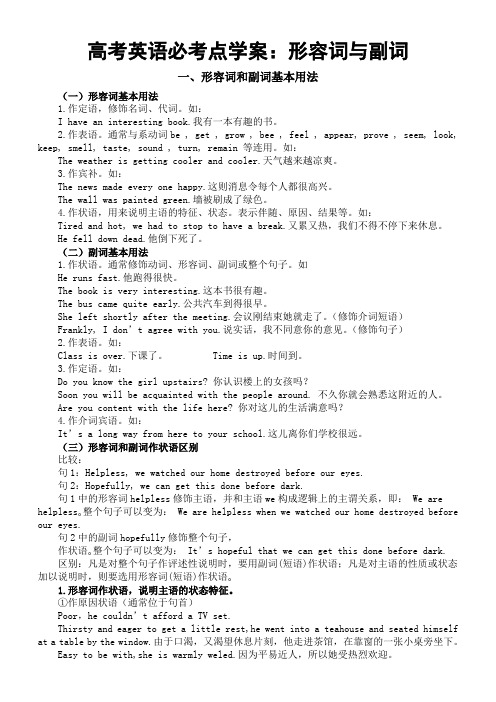
高考英语必考点学案:形容词与副词一、形容词和副词基本用法(一)形容词基本用法1.作定语,修饰名词、代词。
如:I have an interesting book.我有一本有趣的书。
2.作表语。
通常与系动词be , get , grow , bee , feel , appear, prove , seem, look, keep, smell, taste, sound , turn, remain 等连用。
如:The weather is getting cooler and cooler.天气越来越凉爽。
3.作宾补。
如:The news made every one happy.这则消息令每个人都很高兴。
The wall was painted green.墙被刷成了绿色。
4.作状语,用来说明主语的特征、状态。
表示伴随、原因、结果等。
如:Tired and hot, we had to stop to have a break.又累又热,我们不得不停下来休息。
He fell down dead.他倒下死了。
(二)副词基本用法1.作状语。
通常修饰动词、形容词、副词或整个句子。
如He runs fast.他跑得很快。
The book is very interesting.这本书很有趣。
The bus came quite early.公共汽车到得很早。
She left shortly after the meeting.会议刚结束她就走了。
(修饰介词短语)Frankly, I don’t agree with you.说实话,我不同意你的意见。
(修饰句子)2.作表语。
如:Class is over.下课了。
Time is up.时间到。
3.作定语。
如:Do you know the girl upstairs? 你认识楼上的女孩吗?Soon you will be acquainted with the people around. 不久你就会熟悉这附近的人。
(完整版)高考英语形容词与副词考点归纳

B. large
white German C. white large German
• D. German large white
ห้องสมุดไป่ตู้
• 2. ________ students are required to take part in the boat race. (浙江卷)
• A. Ten strong young Chinese B. Ten Chinese strong young C. Chinese ten young strong D. Young strong ten Chinese
• here, there, home, abroad, below等表 示地点或方位的词及today, tomorrow, yesterday, back, out等表示时间或动词 方向词还可以作定语。如:
• Tom isn’t here. (here作表语)
• The people there were very kind to us. (副词there作定语,修饰people)
• A. so well
B. so good
• C. well enough D. good enough
• 2. If I had ________, I’d visit Europe, stopping at the small interesting places.
• A. a long enough holiday B. an enough long holiday C. a holiday enough long D. a long holiday enough
• A.形容词短语作定语时要后置。
• ________ to take this adventure course will certainly learn a lot of useful skills.
高考英语语法必考:形容词和副词
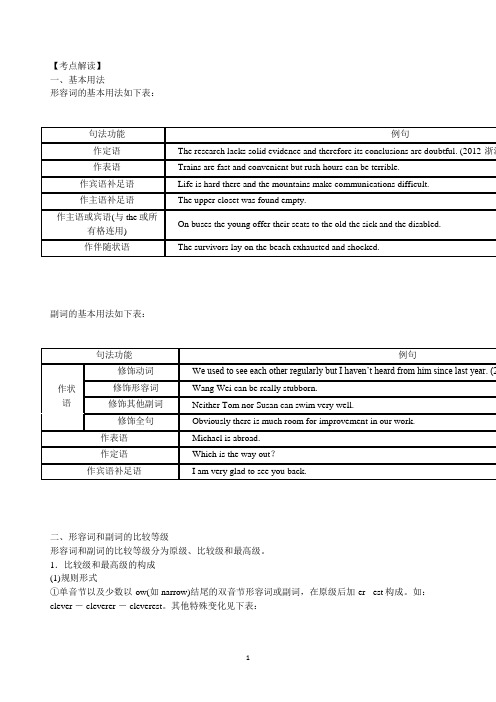
【考点解读】一、基本用法形容词的基本用法如下表:副词的基本用法如下表:二、形容词和副词的比较等级形容词和副词的比较等级分为原级、比较级和最高级。
1.比较级和最高级的构成(1)规则形式①单音节以及少数以-ow(如narrow)结尾的双音节形容词或副词,在原级后加-er -est构成。
如:clever - cleverer - cleverest。
其他特殊变化见下表:②多音节和部分双音节形容词和副词,在原级前加more most构成。
active - more active - most activehappily - more happily - most happily(2)不规则形式good/well - better - bestfar - farther/further - farthest/furthestbad /ill /badly - worse - worstold - older/elder -oldest/eldestmany/much - more - mostlittle - less - least2.基本用法(1)两者相比(甲=乙),用“as+原级+as”表示。
For cheerleaders their sport is just as serious as baxxxxseball or football.【温馨提示】在同等比较级中,若同时出现形容词修饰单数可数名词,其语序为:as+adj.+a+n.+as。
I have never had as boring a day as today.(2)两者相比(甲<乙),用“not as/so+原级+as”表示。
Unfortunately my wife isn’t so fond of them as I am.(3)两者相比(甲>乙),用“比较级+than”表示,(甲<乙)用“less+原级+than”表示。
高考英语形容词和副词详解及练习

高考英语形容词和副词详解及练习-CAL-FENGHAI-(2020YEAR-YICAI)_JINGBIAN英语高考专题复习讲与练形容词和副词一、考点聚焦1、形容词、副词的作用与位置形容词是用来修饰名词的,常被放在名词前作定语,或放在系动词后面作表语。
而副词则用来修饰形容词、动词,其他副词或者句子,一般位于形容词之前,动词之后或句子之首。
以下属几种特殊情况,须牢记;(1)形容词短语作定语,定语后置。
a language difficult to master, a leaning tower about 180 feet high(2)表语形容词(afraid、alike、alone、asleep、awake、alive等)作定语,定语后置。
如a man alive。
有些表身体健康状况的形容词如well、faint、ill 只作表语。
sick既可作表语又可作定语,ill如作定语意为“bad”。
(3)用作定语,修饰由不定代词one、no、any、some和every构成的复合词如anything、something等时,通常后置。
如:I have something important to tell you.(4)else常用作疑问代词和不定代词的后置定语。
(5)enough、nearby修饰名词前置或后置,程度副词一般位于形容词、副词前面,enough修饰形容词、副词时,必须后置。
(6)几个副词并列作状语时,其顺序较灵活,但一般是:方式→地点→时间。
如:We had a good time together outdoors last Sunday.(7)频度副词如often、always、usually等在be动词后,行为动词前。
(8)副词作定语,定语后置。
如:The person there is waiting for you.(9)几个并列的形容词作定语,其语序通常为:限定语(The、A)+ 描绘性形容词 + size(大小)+ shape(形状)+ age(年龄、时间)+ color(颜色)+ origin(国籍、来源)+ material(材料)+ purpose(目的)+ 名词。
高考英语形容词和副词专题讲解及高频考点分析
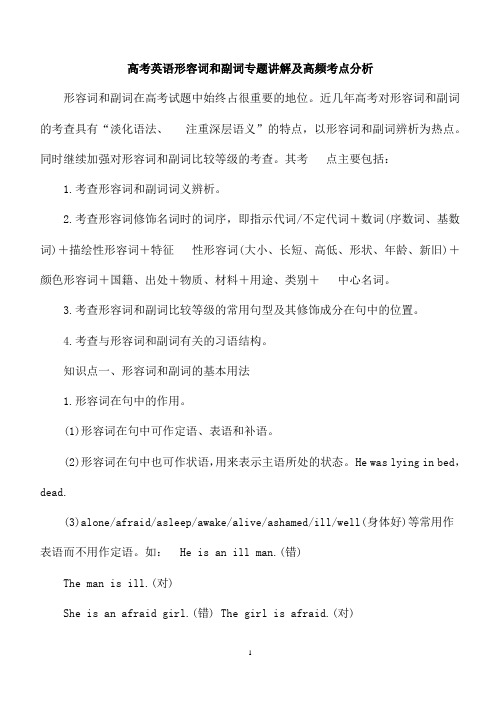
高考英语形容词和副词专题讲解及高频考点分析形容词和副词在高考试题中始终占很重要的地位。
近几年高考对形容词和副词的考查具有“淡化语法、注重深层语义”的特点,以形容词和副词辨析为热点。
同时继续加强对形容词和副词比较等级的考查。
其考点主要包括:1.考查形容词和副词词义辨析。
2.考查形容词修饰名词时的词序,即指示代词/不定代词+数词(序数词、基数词)+描绘性形容词+特征性形容词(大小、长短、高低、形状、年龄、新旧)+颜色形容词+国籍、出处+物质、材料+用途、类别+中心名词。
3.考查形容词和副词比较等级的常用句型及其修饰成分在句中的位置。
4.考查与形容词和副词有关的习语结构。
知识点一、形容词和副词的基本用法1.形容词在句中的作用。
(1)形容词在句中可作定语、表语和补语。
(2)形容词在句中也可作状语,用来表示主语所处的状态。
He was lying in bed,dead.(3)alone/afraid/asleep/awake/alive/ashamed/ill/well(身体好)等常用作表语而不用作定语。
如: He is an ill man.(错)The man is ill.(对)She is an afraid girl.(错) The girl is afraid.(对)(4)two?year?old/200?metre?long/one?thousand?word 等复合形容词中的名词要用单数,一般只用作前置定语。
如:Tom is a two?year?old boy.2.副词在句中的作用。
副词在句中一般用作状语,修饰动词、形容词或其他副词,也可修饰整个句子。
如:Obviously you are wrong.知识点二、常用连接性副词的用法1.though 用作副词时,常在句末,意为“然而,可是”,表示转折意义。
2.therefore“ 因此,所以”,表示结果。
3.meanwhile“与此同时,在此期间”,表示前后分句的动作同时发生。
高中英语2024届高考复习核心形容词副词汇总(兴奋+羞愧)
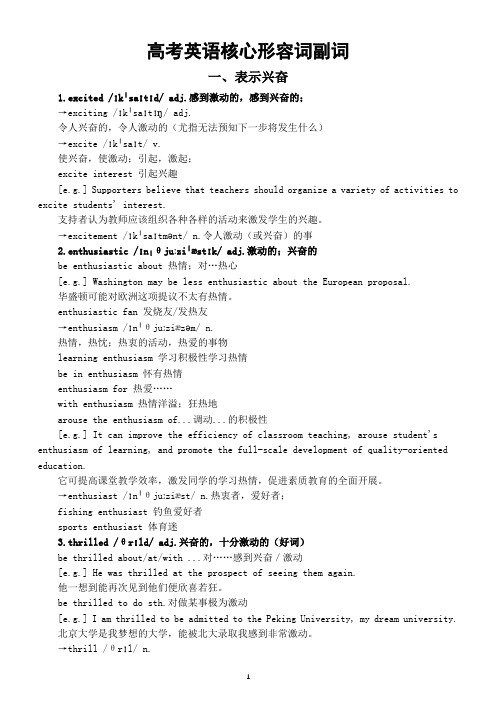
高考英语核心形容词副词一、表示兴奋1.excited /ɪkˈsaɪtɪd/ adj.感到激动的,感到兴奋的;→exciting /ɪkˈsaɪtɪŋ/ adj.令人兴奋的,令人激动的(尤指无法预知下一步将发生什么)→excite /ɪkˈsaɪt/ v.使兴奋,使激动;引起,激起;excite interest 引起兴趣[e.g.] Supporters believe that teachers should organize a variety of activities to excite students' interest.支持者认为教师应该组织各种各样的活动来激发学生的兴趣。
→excitement /ɪkˈsaɪtmənt/ n.令人激动(或兴奋)的事2.enthusiastic /ɪnˌθjuːziˈæstɪk/ adj.激动的;兴奋的be enthusiastic about 热情;对…热心[e.g.] Washington may be less enthusiastic about the European proposal.华盛顿可能对欧洲这项提议不太有热情。
enthusiastic fan 发烧友/发热友→enthusiasm /ɪnˈθjuːziæzəm/ n.热情,热忱;热衷的活动,热爱的事物learning enthusiasm 学习积极性学习热情be in enthusiasm 怀有热情enthusiasm for 热爱……with enthusiasm 热情洋溢;狂热地arouse the enthusiasm of...调动...的积极性[e.g.] It can improve the efficiency of classroom teaching, arouse student's enthusiasm of learning, and promote the full-scale development of quality-oriented education.它可提高课堂教学效率,激发同学的学习热情,促进素质教育的全面开展。
高考英语形容词和副词在语法填空和改错题中的6个考点
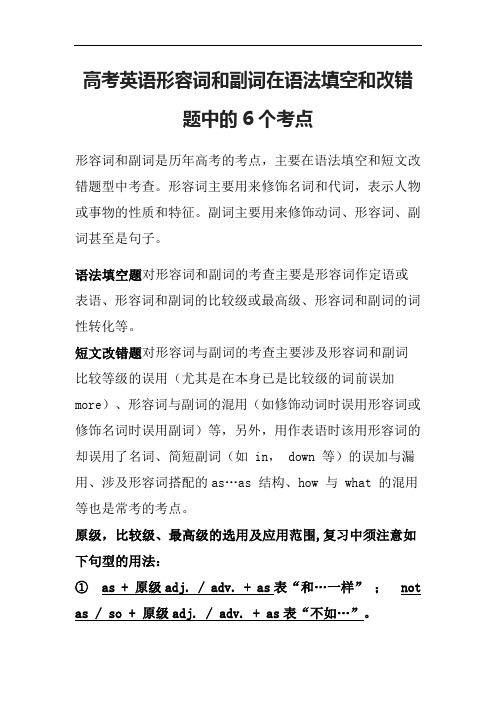
高考英语形容词和副词在语法填空和改错题中的6个考点形容词和副词是历年高考的考点,主要在语法填空和短文改错题型中考查。
形容词主要用来修饰名词和代词,表示人物或事物的性质和特征。
副词主要用来修饰动词、形容词、副词甚至是句子。
语法填空题对形容词和副词的考查主要是形容词作定语或表语、形容词和副词的比较级或最高级、形容词和副词的词性转化等。
短文改错题对形容词与副词的考查主要涉及形容词和副词比较等级的误用(尤其是在本身已是比较级的词前误加more)、形容词与副词的混用(如修饰动词时误用形容词或修饰名词时误用副词)等,另外,用作表语时该用形容词的却误用了名词、简短副词(如 in, down 等)的误加与漏用、涉及形容词搭配的as…as 结构、how 与 what 的混用等也是常考的考点。
原级,比较级、最高级的选用及应用范围,复习中须注意如下句型的用法:①as + 原级adj. / adv. + as表“和…一样” ;not as / so + 原级adj. / adv. + as表“不如…”。
例如:John plays football as well as David.Tom does not play the piano so/as well as Jack.The violin in the other shop will be cheaper, but not as good.②as + 原级adj. + a(n) + n. + as表“跟…一样”。
例如:It’s believed that teaching is as much an art as it is a science.Our neighbor has as big a house as ours.③比较级 + than表“比…更” ;less+原级+ than表“不如…”。
例如:This year they have produced less grain than they did last year.This road is wider than that one.④the + 比较级, the + 比较级,表示“越…,就会越…”。
高考英语语法知识总结形容词和副词
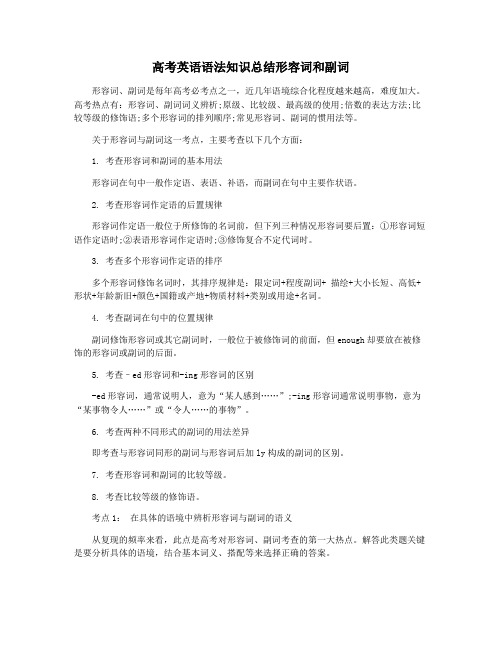
高考英语语法知识总结形容词和副词形容词、副词是每年高考必考点之一,近几年语境综合化程度越来越高,难度加大。
高考热点有:形容词、副词词义辨析;原级、比较级、最高级的使用;倍数的表达方法;比较等级的修饰语;多个形容词的排列顺序;常见形容词、副词的惯用法等。
关于形容词与副词这一考点,主要考查以下几个方面:1. 考查形容词和副词的基本用法形容词在句中一般作定语、表语、补语,而副词在句中主要作状语。
2. 考查形容词作定语的后置规律形容词作定语一般位于所修饰的名词前,但下列三种情况形容词要后置:①形容词短语作定语时;②表语形容词作定语时;③修饰复合不定代词时。
3. 考查多个形容词作定语的排序多个形容词修饰名词时,其排序规律是:限定词+程度副词+ 描绘+大小长短、高低+形状+年龄新旧+颜色+国籍或产地+物质材料+类别或用途+名词。
4. 考查副词在句中的位置规律副词修饰形容词或其它副词时,一般位于被修饰词的前面,但enough却要放在被修饰的形容词或副词的后面。
5. 考查–ed形容词和-ing形容词的区别-ed形容词,通常说明人,意为“某人感到……”;-ing形容词通常说明事物,意为“某事物令人……”或“令人……的事物”。
6. 考查两种不同形式的副词的用法差异即考查与形容词同形的副词与形容词后加ly构成的副词的区别。
7. 考查形容词和副词的比较等级。
8. 考查比较等级的修饰语。
考点1:在具体的语境中辨析形容词与副词的语义从复现的频率来看,此点是高考对形容词、副词考查的第一大热点。
解答此类题关键是要分析具体的语境,结合基本词义、搭配等来选择正确的答案。
经过统计,常见常考的形容词和副词有按频度排列:even; interested;interesting; yet; hardly; just; therefore; though; too; very; common;effective; either; ever; fair; however; less; more; nearly; only;purposefully; rather; still; such; surprised; surprising还有以下形容词和副词应当熟悉和掌握: a good many; a number of; acceptable; accidentally; actively; adequately; already; another; anxious; anyway; ashamed; attentively; bad; badly; besides; better; but; careful; changeable; cheap; comfortable; convenient; eagerly; easy; encouraging; enha-ncing; equal; even though; eventually; fairly; far; fewer;following; formally; friendly; gen-erously; gradually; heavily; historic; hopefully; immediately; inaccessible; individual; inevit-able; initial; instead; invisible; largely; never; next; no;normal; nowadays; obviously; ordin-ary; other; otherwise; patient;plenty of; prac-tical; promoting; proper; quickly; readily; reasonable; remote; seldom; seriously; short; so; stimulating; traditional; unavailable; unav-oidable; unfavorable; unfortunately; usual; va-rious; weak; well考点2:考查形容词、副词的比较级、最高级及前面的修饰语【备考清单】1 比较级、最高级的选用及应用范围比较级、最高级常用于表示两者或多者间的比较。
高中英语2024届高考复习核心形容词副词汇总(共四类)
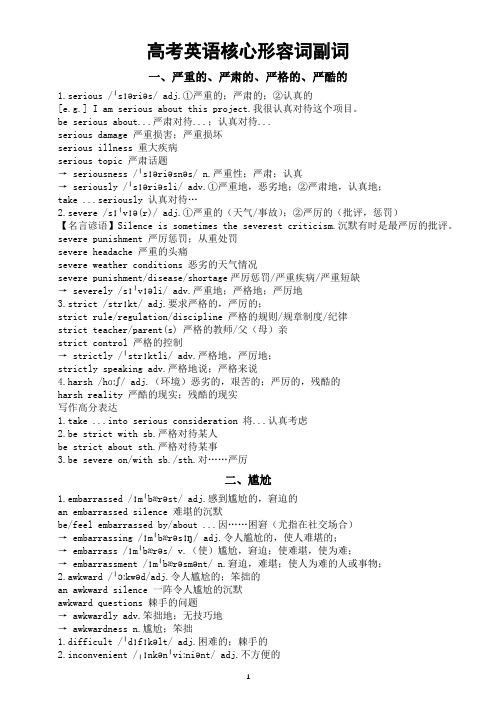
高考英语核心形容词副词一、严重的、严肃的、严格的、严酷的1.serious /ˈsɪəriəs/ adj.①严重的;严肃的;②认真的[e.g.] I am serious about this project.我很认真对待这个项目。
be serious about...严肃对待...;认真对待...serious damage 严重损害;严重损坏serious illness 重大疾病serious topic 严肃话题→ seriousness /ˈsɪəriəsnəs/ n.严重性;严肃;认真→ seriously /ˈsɪəriəsli/ adv.①严重地,恶劣地;②严肃地,认真地;take ...seriously 认真对待…2.severe /sɪˈvɪə(r)/ adj.①严重的(天气/事故);②严厉的(批评,惩罚)【名言谚语】Silence is sometimes the severest criticism.沉默有时是最严厉的批评。
severe punishment 严厉惩罚;从重处罚severe headache 严重的头痛severe weather conditions 恶劣的天气情况severe punishment/disease/shortage严厉惩罚/严重疾病/严重短缺→ severely /sɪˈvɪəli/ adv.严重地;严格地;严厉地3.strict /strɪkt/ adj.要求严格的,严厉的;strict rule/regulation/discipline 严格的规则/规章制度/纪律strict teacher/parent(s) 严格的教师/父(母)亲strict control 严格的控制→ strictly /ˈstrɪktli/ adv.严格地,严厉地;strictly speaking adv.严格地说;严格来说4.harsh /hɑːʃ/ adj.(环境)恶劣的,艰苦的;严厉的,残酷的harsh reality 严酷的现实;残酷的现实写作高分表达1.take ...into serious consideration 将...认真考虑2.be strict with sb.严格对待某人be strict about sth.严格对待某事3.be severe on/with sb./sth.对……严厉二、尴尬1.embarrassed /ɪmˈbærəst/ adj.感到尴尬的,窘迫的an embarrassed silence 难堪的沉默be/feel embarrassed by/about ...因……困窘(尤指在社交场合)→ embarrassing /ɪmˈbærəsɪŋ/ adj.令人尴尬的,使人难堪的;→ embarrass /ɪmˈbærəs/ v.(使)尴尬,窘迫;使难堪,使为难;→ embarrassment /ɪmˈbærəsmənt/ n.窘迫,难堪;使人为难的人或事物;2.awkward /ˈɔːkwəd/adj.令人尴尬的;笨拙的an awkward silence 一阵令人尴尬的沉默awkward questions 棘手的问题→ awkwardly adv.笨拙地;无技巧地→ awkwardness n.尴尬;笨拙1.difficult /ˈdɪfɪkəlt/ adj.困难的;棘手的2.inconvenient /ˌɪnkənˈviːniənt/ adj.不方便的3.clumsy /ˈklʌmzi/ adj.笨拙的4.ashamed /əˈʃeɪmd/ adj.尴尬的;羞愧的;羞耻的尴尬”的反义词fortable /ˈkʌmftəb(ə)l/ adj.舒适的2.convenient /kənˈviːniənt/ adj.方便的3.handy /ˈhændi/adj.便利的;灵巧的三、好奇1.curious /ˈkjʊəriəs/ adj.好奇的be curious about 对……感到好奇[e.g.]She was curious about the news.她对这个新闻感到好奇。
高考英语形容词与副词考点归纳
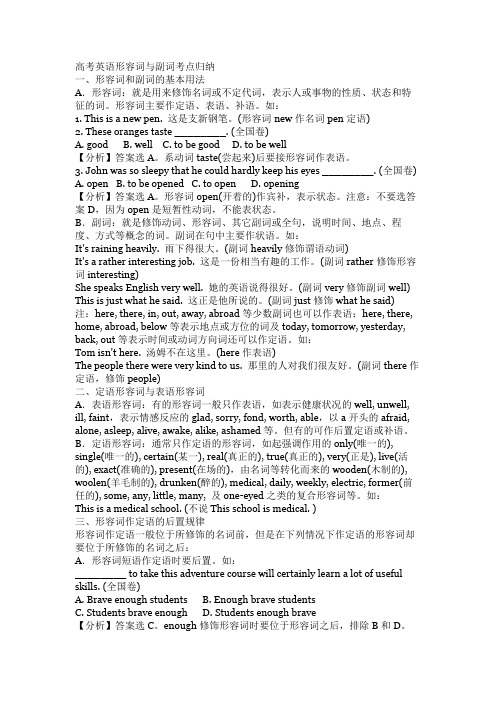
高考英语形容词与副词考点归纳一、形容词和副词的基本用法A.形容词:就是用来修饰名词或不定代词,表示人或事物的性质、状态和特征的词。
形容词主要作定语、表语、补语。
如:1. This is a new pen. 这是支新钢笔。
(形容词new作名词pen定语)2. These oranges taste ________. (全国卷)A. goodB. wellC. to be goodD. to be well【分析】答案选A。
系动词taste(尝起来)后要接形容词作表语。
3. John was so sleepy that he could hardly keep his eyes ________. (全国卷)A. openB. to be openedC. to openD. opening【分析】答案选A。
形容词open(开着的)作宾补,表示状态。
注意:不要选答案D,因为open是短暂性动词,不能表状态。
B.副词:就是修饰动词、形容词、其它副词或全句,说明时间、地点、程度、方式等概念的词。
副词在句中主要作状语。
如:It's raining heavily. 雨下得很大。
(副词heavily修饰谓语动词)It's a rather interesting job. 这是一份相当有趣的工作。
(副词rather修饰形容词interesting)She speaks English very well. 她的英语说得很好。
(副词very修饰副词well) This is just what he said. 这正是他所说的。
(副词just修饰what he said)注:here, there, in, out, away, abroad等少数副词也可以作表语;here, there, home, abroad, below等表示地点或方位的词及today, tomorrow, yesterday, back, out等表示时间或动词方向词还可以作定语。
高考英语形容词和副词考点总结。

高考英语:形容词和副词【考查要点】1) 原级,比较级、最高级的选用及应用范围,复习中须注意如下句型的用法:①as + 原级adj. / adv. + as表“和…一样”;not as / so + 原级adj. / adv. + as表“不如…”。
例如:John plays football as well as David. Tom does not play the piano so/as well as Jack.The violin in the other shop will be cheaper, but not as good.②as + 原级adj. + a(n) + n. + as表“跟…一样”。
如It’s believed that teaching is as much an art as it is a science. Our neighbor has as big a house as ours.③比较级+ than表“比…更”;less+原级+ than表“不如…”。
如:This year they have produced less grain than they did last year. This road is wider than that one.④the + 比较级,the + 比较级表示“越…,就会越…”。
例如:It’s believed that the harder you work, the better result you’ll get.⑤the +比较级+ of the + two/名词/代词表两者中“较…的一个”。
如:Who is the younger of the two boys?⑥比较级+and+ 比较级表示:越来越…。
如:Our country is getting stronger and stronger.⑦用the last表示“最不可能的”、“最不适合的”、“最不希望的”等。
高考英语形容词和副词三十大核心考点
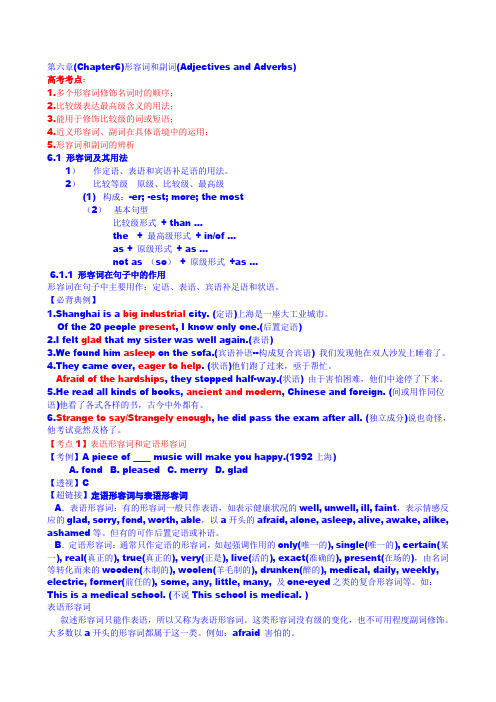
第六章(Chapter6)形容词和副词(Adjectives and Adverbs)高考考点:1.多个形容词修饰名词时的顺序;2.比较级表达最高级含义的用法;3.能用于修饰比较级的词或短语;4.近义形容词、副词在具体语境中的运用;5.形容词和副词的辨析6.1 形容词及其用法1)作定语、表语和宾语补足语的用法。
2)比较等级原级、比较级、最高级(1) 构成:-er; -est; more; the most(2)基本句型比较级形式+ than …the+ 最高级形式+ in/of …as + 原级形式+ as …not as (so)+ 原级形式+as …6.1.1 形容词在句子中的作用形容词在句子中主要用作:定语、表语、宾语补足语和状语。
【必背典例】1.Shanghai is a big industrial city. (定语)上海是一座大工业城市。
Of the 20 people present, I know only one.(后置定语)2.I felt glad that my sister was well again.(表语)3.We found him asleep on the sofa.(宾语补语--构成复合宾语) 我们发现他在双人沙发上睡着了。
4.They came over, eager to help. (状语)他们跑了过来,亟于帮忙。
Afraid of the hardships, they stopped half-way.(状语) 由于害怕困难,他们中途停了下来。
5.He read all kinds of books, ancient and modern, Chinese and foreign. (间或用作同位语)他看了各式各样的书,古今中外都有。
6.Strange to say/Strangely enough, he did pass the exam after all. (独立成分)说也奇怪,他考试竟然及格了。
高考英语形容词和副词讲解
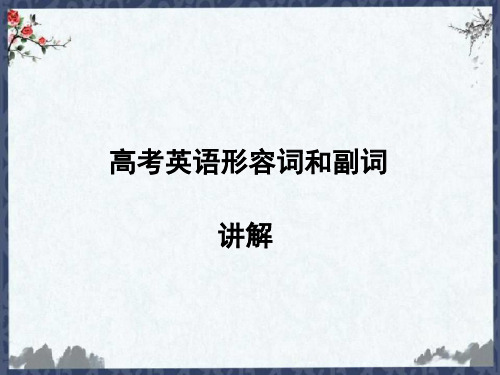
2.-ed形容词通常用于说明人的感受,常译为“感到……的”,强 调人自身的情感波动;修饰事物时,则多修饰air(神态),smile (微笑),feeling (感觉),appearance (容貌),cry (哭声),face (表情),voice (声音),mood (情绪),look (表情),eye (眼神)等 显示某人情感状况的名词。
在下列情况下,形容词要放在被修饰词的后面。 (1)形容词作定语修饰somebody,something,anyone,anything, nobody等复合代词时,需后置。 Is there anything wrong with your car? 你的汽车出什么毛病了吗?
(2)以-able或-ible结尾的形容词可置于由形容词的最高级或all, every,only等词修饰的名词后面。 This is the best computer available. 这是现在可用的最好的一台电脑。 (3)形容词短语作定语要后置。 That is a problem difficult to answer. 那是一个难以回答的问题。 (4)表语形容词(alive,asleep,awake,alike,available等)作定语, 一般要后置。 The girl awake is his younger sister. 那个醒着的女孩是他的妹妹。
填一填
3.present 目前的,现在的;出场的,出席的
目前的形势
在场的雇员
答案 the present situation;the employees present
4.concerned 担心的,焦虑的;有关的,有牵连的
忧心忡忡的医生
(与……事情)有关的医生
答案 the concerned doctor;the doctor concerned
高三英语高考语法知识点归纳总结形容词和副词

用比较级来表达最高级的意思
我从来没有度过这样令人烦恼的一天。 (意为:我度过了最为令人烦恼的一天。 )
表达法一: A is three(four, etc.)times the size(height,
length etc.)of B. The new building is four times the size(the height)of the old one. 这座新楼是那座旧楼的四倍大(高) / 这座新楼比那 座旧楼大(高)三倍。 表达法二: A is three(four, etc.)times as big(high, long,
perfect, superior,junior 等
twice 或 double. 注意: 1. 可以修饰比较级的词有: much, many, a lot, even, far, a bit, a little, still, yet, by far, any,
a great deal;
2. 表示“最高程度“的形容词没有最高级和比较级。如:
favourite, excellent, extreme,
only 修饰的名词之后
the best book available, the only solution possible
alive, alike, awake, aware, asleep 等作定语时后 3
置
the only person awake
4 和空间、时间、单位连用时 5 成对的形容词可以后置
a bridge 50 meters long a huge room simple and beautiful
6 形容词短语一般后置
a man difficult to get on with
高中英语2025届高考语法复习形容词与副词知识讲解
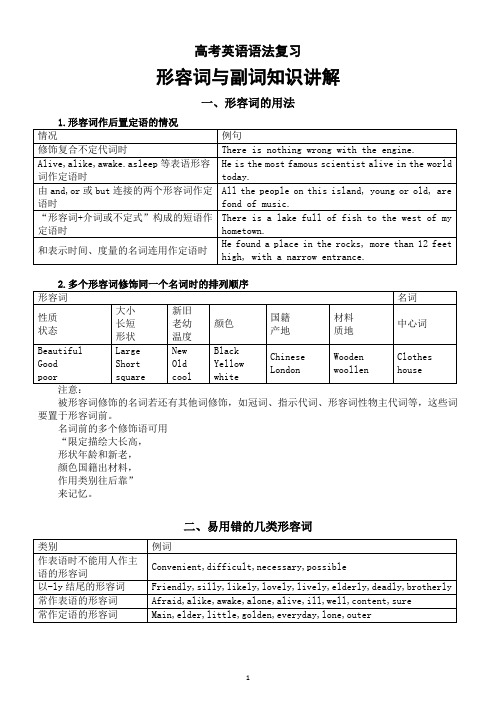
高考英语语法复习
形容词与副词知识讲解
一、形容词的用法
被形容词修饰的名词若还有其他词修饰,如冠词、指示代词、形容词性物主代词等,这些词要置于形容词前。
名词前的多个修饰语可用
“限定描绘大长高,
形状年龄和新老,
颜色国籍出材料,
作用类别往后靠”
来记忆。
二、易用错的几类形容词
三、形容词的比较等级
English is as interesting a subject as Chinese.
Which is the better of the two watches?
She is the taller of the two girls.
other或else把主语排除在比较对象之外;但如果不在同一范围比较则不需要用。
Susan is taller than any girl in her sister’s class.
四、副词的句法功能
五、副词的位置
六、副词比较等级的用法。
高中英语2024届高考复习核心形容词副词汇总(公平+积极消极+可能+熟悉+突然+严格)
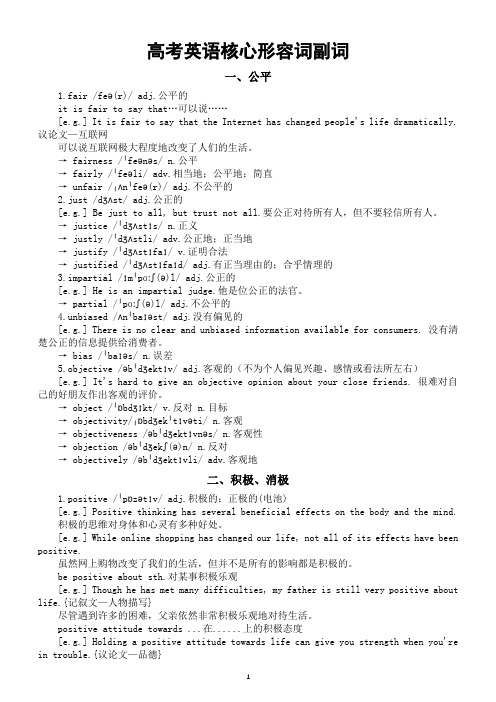
高考英语核心形容词副词一、公平1.fair /feə(r)/ adj.公平的it is fair to say that…可以说……[e.g.] It is fair to say that the Internet has changed people's life dramatically.议论文—互联网可以说互联网极大程度地改变了人们的生活。
→ fairness /ˈfeənəs/ n.公平→ fairly /ˈfeəli/ adv.相当地;公平地;简直→ unfair /ˌʌnˈfeə(r)/ adj.不公平的2.just /dʒʌst/ adj.公正的[e.g.] Be just to all, but trust not all.要公正对待所有人,但不要轻信所有人。
→ justice /ˈdʒʌstɪs/ n.正义→ justly /ˈdʒʌstli/ adv.公正地;正当地→ justify /ˈdʒʌstɪfaɪ/ v.证明合法→ justified /ˈdʒʌstɪfaɪd/ adj.有正当理由的;合乎情理的3.impartial /ɪmˈpɑːʃ(ə)l/ adj.公正的[e.g.] He is an impartial judge.他是位公正的法官。
→ partial /ˈpɑːʃ(ə)l/ adj.不公平的4.unbiased /ʌnˈbaɪəst/ adj.没有偏见的[e.g.] There is no clear and unbiased information available for consumers. 没有清楚公正的信息提供给消费者。
→ bias /ˈbaɪəs/ n.误差5.objective /əbˈdʒektɪv/ adj.客观的(不为个人偏见兴趣、感情或看法所左右)[e.g.] It's hard to give an objective opinion about your close friends. 很难对自己的好朋友作出客观的评价。
高中英语高考语法复习形容词与副词

高考英语形容词与副词一、形容词01 形容词的句法功能02 形容词的位置形容词作定语时一般置于被修饰词前作前置定语,下列情况中形容词通常后置于被修饰词。
(1)修饰something,anybody,nobody,anything等复合不定代词时There is nothing wrong with the machine.(机器什么问题都没有。
)(2)形容词词组作定语时She bought a book suitable for children.(她买了本适合孩子们的图书。
)(3)修饰表示数量的词要后置The baby is only five months old.(这个婴儿仅有五个月大。
)(4)enough作形容词修饰名词时,一般放在名词之前,也可放在名词之后We don't bring enough money.(我们没带够钱。
)There‘ll be time enough to relax when you’ve finished your work.(你完成工作后会有足够的时间来放松。
)[注]形容词常见于定语位置和表语位置,以上只列出几种常见情况讲解。
具体位置要视具体形容词及句子而定。
03 多个形容词修饰名词时的语序按以下顺序排列:(1)限定词(a/an,the,this,his,first,one...)(2)表示特征或性质等描述性形容词(good,pretty...)(3)表示大小、长短、高低的形容词(big,long,little...)(4)表示形状的形容词(round,square...)(5)表示年龄、新旧的形容词(old,young,new...)(6)表示颜色的形容词(red,yellow...)(7)表示国籍、地区、出处的形容词(America,southern,Italian...)(8)表示物质材料的形容词(wooden,woollen,glass...)(9)表示用途、类别的形容词(medical,writing...)a beautiful large green Chinese carpet一块漂亮宽大的绿色的中国地毯the first three days 头三天enormous black iron gates 巨大的黑色铁门04 形容词的特殊用法二、副词01 副词的种类根据词义可分为:(1)时间副词yesterday(昨天),today(今天),now(现在)等。
高考英语语法之形容词和副词

高考英语语法之形容词和副词第一部分考点精讲精练第1讲比较级考点1.可以修饰比较级的词常用来修饰比较级的词或短语有:a bit, a little, rather, much, far, by far, many, a lot, a great deal, any, still, even等。
by far的用法:用于强调,意为―……得多‖ ―最最……‖ ―显然‖等,可修饰形容词或副词的比较级和最高级,通常置于其后,但是若比较级或最高级前有冠词,则可置于其前或其后。
如:It’s quicke r by far to go by train. 乘火车要快得多。
She ran fastest by far. 她跑得最快(显然她跑得最快)。
He’s by far the cleverer student.他是个聪明得多的孩子。
He is by far the best teacher.=He is the best teacher by far.他是最最好的老师(或他显然是最好的老师)。
1.You are such a woman as always think ____ ofyourself than others.A. muchB. much moreC. littleD. much less2.【2004福建】The number of people present at theconcert was _____than expected. There were many ticket left.A. much smallerB. much moreC. much largerD. many more3.-The novel is, I have to say, not a bit interesting,How do you find it?-Why! It’s ____________ that I have ever read.A. a most interestingB. a more interestedC. a less interestingD. by far the most interesting4.【2007 全国II】After two years’ research, we no whave a ____ better understanding of the disease.A. veryB. farC. fairlyD. quite5.------ The disease he suffers is not easy to cure.------ I know, but is he _____ better?A. muchB. ratherC. anyD. little6.【2000上海】You're standing too near the camera.Can you move ______ ?A. a bit farB. a little fartherC. a bit of fartherD. a little far7.【2006江苏】I wish you’d do ________ talking andsome more work. Thus things will become better.A. a bit lessB. any lessC. much moreD. a little more考点2.more 、much与比较级more 和多音节形容词和副词一起构成比较级,如more interesting, more exciting单音节词和部分双音节词在后面加-er构成比较级.如:taller, earlier, hottermuch修饰比较级。
- 1、下载文档前请自行甄别文档内容的完整性,平台不提供额外的编辑、内容补充、找答案等附加服务。
- 2、"仅部分预览"的文档,不可在线预览部分如存在完整性等问题,可反馈申请退款(可完整预览的文档不适用该条件!)。
- 3、如文档侵犯您的权益,请联系客服反馈,我们会尽快为您处理(人工客服工作时间:9:00-18:30)。
2013年高考英语【形容词、副词】讲义形容词和副词在高考中的考查重点:1.形容词、副词的作用与位置;①多个形容词作定语排列的顺序②enough作修饰成分时的位置问题及形容词作后置定语③形容词作伴随状语和原因状语2.表语形容词的特点及连系动词+形容词作表语;3.形容词、副词比较等级的用法;①原级的用法②比较级的用法③最高级的用法④形容词和副词前面使用冠词的情况⑤由as/so组成的形容词或副词短语⑥more /less than及其相关结构4.容易混淆的形容词、副词的区别。
【常考点一:基本用法。
】1、复合形容词构成:副词词干+现在分词:hard-working名词词干+过去分词:man-made名词词干+现在分词:time-consuming名词词干+形容词:world-famous数词词干+名词:five=star数词词干+名词+形容词:5-year-old2、形容词的位置:*形容词作定语修饰由some-,any-,every-,no-和-body,-thing,-one等构成的复合不定代词时,需要后置。
There is nobody absent today,sir.There is nothing new of the new president’s speech.*形容词+不定式构成的短语作定语时,后置。
The students asked me a question too difficult to answer.常考点二:多个形容词作定语时的排列顺序。
当两个或以上的形容词修饰一个名词时,与被修饰的名词关系较为密切的越靠近名词;若几个形容词的密切程度差不多,则音节少的在前。
如:a small wonderful gift.(一份小的、精致的礼物。
)一般顺序为:限定词(冠词、数词、代词)+描绘形容词(beautiful)+大小、长短、高低等形体形容词+新旧+颜色+国籍+材料+用途+被修饰名词。
一句话经典:(一个美小圆旧黄,英国木书房)A beautiful small round old yellow British wooden study house.例子:a light blue silk skirt另外三本英语书一些美丽的小红花The first beautiful little white Chinese stone bridge1、Finally we were told that this____girl was Linda's cousin form Australia yesterday.A. pretty little SpanishB. Spanish little prettyC. Spanish prettyD. little pretty Spanish2、—How was your recent visit to Chengdu?—It was great. We visited some friends,and spent the ___days at the seaside. A. few last sunny B. last few sunny C. last sunny few D. few sunny last【常考点三:enough】1、修饰名词时放在其前。
We have enough money.2、做副词修饰形容词、副词时,放在其后。
Strangely enough,she has never been to the Summer Palace.3、can’t…enough = can not/never…too…(再……也不为过。
)We can’t be careful enough when we are driving.【例题】1、—Mum, I think I'm ________ to get back to school.—Not really, my dear. You'd better stay at home for another day or two.A. so wellB. so goodC. well enoughD. good enough2、If I had _____, I'd visit Europe stopping at all the small interesting places.A. a long enough holidayB. an enough long holidayC. a holiday enough longD. a long holiday enough3、________ to take this adventure course will certainly learn a lot of useful skills.A. Brave enough studentsB. Enough brave studentsC. Students brave enoughD. Students enough brave【常考点四:比较等级。
】1、平级比较:*用as…as…;not …as…as…引导。
Henry is a worker as good as Peter(is).=Henry is as good a worker as Peter(is).It is generally believedthat teaching is as much an art as it is a science.*as+形容词+as+数量词=数量词+形容词。
Yaoming is as tall as 2.26 meters.2、与as有关固定结构:As long as只要,as far as远及……,就…而言;as soon as 一…..就;as well as 既……又;3、比较级A、比较级常见修饰语:rather、much、still、even、far、any(否定或疑问)、a lot,a little、a great deal,by far,a bit,three times等。
The students study even harder than ever before.B、the+比较级…,the+比较级(越来越)The more you talked,the less attention he paid to you.C、比较级+and+比较级(越来越)China is becoming more and more beautiful.China is becoming stronger and stronger and stronger.D、介词by表示相差程度。
Yaoming is taller than you by 1 meter.E、一个人两种品质比较:more…than…意为:与其……不如。
—Ann acts quite unfriendly to us.—I think she is more shy than unfriendly.F、比较对象不能相互包含,常见句型是:The Yangtze River is longer than any other river in China.China is larger than any other country in Asia.China is larger than any country in Asia.G、比较对象相同:The weather in Nanchong is warmer than that of Shanghai. The iphones made in China are better than those in Indonesia.【常考点五】表示倍数的几个句型:1、A is N times as 形容词/副词原级as B.2、A is N times 形容词/副词比较级than B.3、A is N times the 性质名词(height/depth/length/size)of B.4、The+名词is N times what从句。
Tom can eat 5 times as much rice as Bruce.The output of wheat this year is 3 times what it was in 2008.【例题】The new stadium being built for the next Asian Games will be ____ the present one.A. as 3 times big asB. 3 times as big asC. as big as 3 timesD. as big 3 times as【常考点六】下列形容词作表语,常不用人做主语。
Possible、impossible、necessary、convenient、inconvenient(注:likely例外)It is possible that it will rain tomorrow.John is likely to win the first place of the skiing competition.比较:rather、fairly、quiteThis is a fairly easy book,which the children can read.This pair is rather too large.It’s rather warm today.That is quite impossible.(1) The sofa looks ________ shabby in the room.(2) The suitcase is ________ light. I think I can carry it.(3)It’s _______ warm today. Let’s go for a walk along the river.(4)He drives _______ fast. It’s dangerous.(5) I have ________ a few letters to type.(6)It’s _______ cold outside. Put on your overcoat.(7)The old minister _______ knew what to say before the emperor.(8)The young scientist is _______used to wording far into the night.Keys: 1 rather 2 fairly 3 fairly / quite 4 rather 5 quite 6 rather 7 quite 8 quite。
